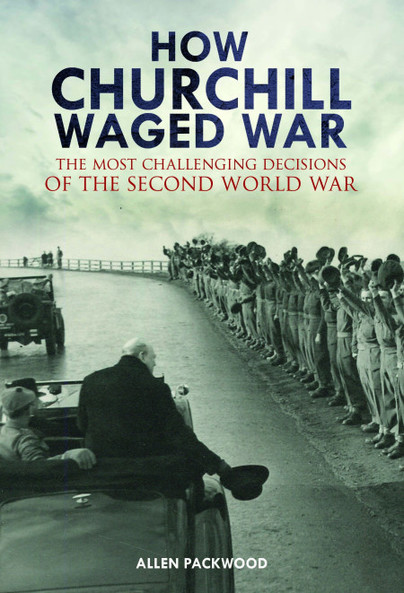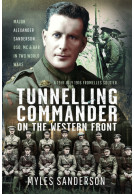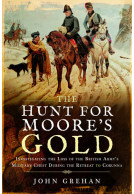Roosevelt and Churchill The Atlantic Charter (Hardback)
A Risky Meeting at Sea that Saved Democracy
(click here for international delivery rates)
Order within the next 3 hours, 35 minutes to get your order processed the next working day!
Need a currency converter? Check XE.com for live rates
| Other formats available | Price |
|---|---|
| Roosevelt and Churchill The Atlantic… Paperback Add to Basket | £14.99 |
| Roosevelt and Churchill The Atlantic… ePub (12.2 MB) Add to Basket | £6.99 |
Winston Churchill was no stranger to storms. They had engulfed him in various ways throughout his long career and he had always turned to face them with jutting jaw and indomitable spirit. Dark clouds had hovered over him from the moment he became Britain’s Prime Minister in May 1940. Now, fifteen harrowing months later, he was setting out to meet President Franklin Roosevelt, the one man who could offer real assistance in his hour of need. And another storm awaited – this time one of a meteorological kind as his ship, HMS Prince of Wales, ran into a howling gale within hours of leaving its base at Scapa Flow.
Churchill demanded to be escorted to the Captain’s cabin. His escort was a nervous young officer who feared that, in total darkness up swaying stairs, the Prime Minister, a man of some girth, might fall into the roiling sea. But Churchill relished it, remarking later that it was like an adventure after being trapped in No.10 Downing Street. The storm was so bad that the three-destroyer escort, sailing alongside to ward off the very real prospect of the battleship being torpedoed by German U-Boats, could not keep up. Undaunted, Churchill gave the order ‘Full steam ahead!’
The risks were considerable, especially as Churchill had brought the bulk of his senior military staff with him. When he heard of it, the Canadian Prime Minister thought him mad. When the secret journey was revealed a few days later, Members of Parliament were aghast. But, Churchill knew where his deliverance lay, and he knew that he could no longer postpone a meeting with the man who held Britain’s fate in his hands.
After five days, the coast of Newfoundland hove into view and when Britain’s Prime Minister was piped aboard USS Augusta at Placentia Bay, there began a meeting which, in hindsight, could be seen as one of immense profit for the future of mankind. It was a meeting that allowed FDR and Churchill to get to know each other and become friends. It was also a meeting that, somewhat unexpectedly, produced a document, strangely never signed, called The Atlantic Charter – an eight point agreement designed to act as a guide for how the world’s nations should behave towards each other in the post-war years. Many of the principles laid out in this document are incorporated into the Charter of the United Nations.
In this book, the authors seek not only to explain how this document came into being – bits of it being scrawled out on scraps of paper over dinner – but to delve into the lives of the two most prominent and influential figures of the twentieth century. For most people belonging to younger generations, they are but legendary names from history.
In addition the authors have added biographies of the men who helped them change history – Harry Hopkins and Sumner Welles; Lord Beaverbrook and Lord Cadogan as well Randolph Churchill, the rambunctious and often misunderstood son who had a greater influence on his father’s life than many critics were willing to accept.
The creation of the Atlantic Charter stands as a pivotal moment in time – the moment two great leaders, men of courage, empathy and imagination, stood alone against tyranny to save the world.
This account of the meeting at sea of Roosevelt and Churchill was the most momentous meeting of WWII, an yet it receives remarkably little attention. The war in August 1941 was going badly for Britain and the Commonwealth, making this meeting of critical importance. – Most Highly Recommended
Firetrench
Read the full review here
This book to me seems very good, and I’ve learnt quite a bit I hadn’t known before, credit to the two authors Kluger and Evans for a very well researched book. Would I recommend this book? Yes, if you want to learn about the personalities involved it’s a really good book.
UK Historian
5 stars
Read the full review here
About Richard Evans
Richard Evans was born in Paris of British parents at the outset of World War Two. After fleeing the German occupation in June 1940, he returned to Paris in 1945 as a child and was later educated at prep school in Sussex and Canford School in Dorset. Served two years National Service, rising to Acting Captain in the British Army and then resumed journalistic career, joining the Evening Standard as tennis and rugby correspondent. Witnessed Winston Churchill's funeral from the crowd in Westminster. In 1965, emigrated to America and began seven years as a foreign correspondent for the London Evening News in New York and later based in Paris. Joined Robert Kennedy's campaign in Indiana and California and subsequently wrote of his assassination. Had Winston Churchill's grandson as his colleague covering the riot-strewn Democratic Convention in Chicago 1968 and also covered Nixon's re-election in 1972. Made three trips to Vietnam and Cambodia during the war, reporting for ABC Radio and the BBC. Evans has written 22 books, including the history of the Davis Cup and an autobiography, The Roving Eye. He lives with his son, Ashley, in Delray Beach, Florida.
About Michael Kluger
Michael Kluger graduated from Trinity College in Hartford, Connecticut where he earned at B.A. in History in 1978. While at Trinity he was awarded the George B. Cooper Prize in British History. Mr. Kluger also attended the University of Chicago Graduate School of Business where he was awarded an M.B.A in Finance in 1980. Kluger is active in making personal private equity investments in health care. He was a founding partner of Altaris Capital Partners, LLC, a private equity investment firm that focuses exclusively on the health care industry. Prior to launching Altaris in 2002, Kluger spent a decade as a founding partner of Liberty Partners, and before that he held various positions in Merrill Lynch’s investment banking and private equity groups. Kluger is currently on the Board of the Posse Foundation and a Trustee of Trinity College. He has also served on the Board of the Mark Twain Library in Redding, Connecticut. He lives in Palm Beach, Florida with his wife, Heidi Greene. They have two children, August and Anna, who both live and work in New York City.
How Churchill Waged War The Most Challenging Decisions of the Second World War (Hardback)
When Winston Churchill accepted the position of Prime Minister in May 1940, he insisted in also becoming Minister of Defence. He was not going to play the chairman’s role, adjudicating between the competing claims of the ministers below him. He was going to get his hands dirty and take direct personal control of the day-to-day running of military policy. This, though, meant that he alone would be responsible for the success or failure of Britain’s war effort. It also meant that he would be faced with many monumental challenges and utterly crucial decisions upon which the fate of Britain and…
By Allen George PackwoodClick here to buy both titles for £50.00

















